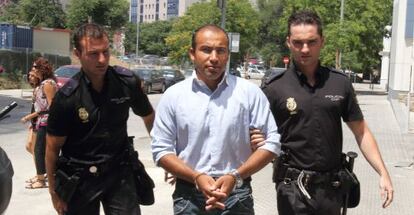No sign of release for Kurd who threw shoe at Turkish premier
Leader was visiting Spain when Hokman Joma lobbed footwear at him in protest

In Spain, throwing a shoe at a visiting Turkish prime minister is apparently a far more serious offense than doing the same to a US president in Iraq. In 2010, Syrian Kurd Hokman Joma was sentenced by a Spanish court to three years in prison after he did just that during a visit to Seville by Turkish premier Recep Tayyip Erdogan.
Two years later, Joma is still behind bars, and is unlikely to be released early.
Shouting “Free Kurdistan,” the 28-year-old failed to hit Erdogan when the Turkish leader got into a car during a visit to the southern city. He was immediately tackled by security guards and arrested.
Joma said during his trial that he never intended to hurt the Turkish prime minister but just wanted to “draw attention” to the situation of the Kurdish people in Turkey. Throwing one’s shoe at somebody is considered a grave insult in much of the Middle East, rather than an attempt at assault.
Joma’s lawyer, Luis Ocaña, says that Joma acted impulsively.
“He hadn’t intended to do anything, he wasn’t prepared at all,” he explains. “He didn’t have a spare pair of shoes with him.”
Ocaña says that Joma explained his actions to him in a letter last year.
“I couldn’t allow myself to be in the same place as that man and to say nothing, to let him just go on his way as though everything was fine. He came to collect a prize, although I don’t understand why they would give him one,” Joma wrote in his letter. “The Turkish government has launched five wars against my people, it has killed thousands of women and children. The only thing that I wanted to do was to draw attention to the question, so that people would know that the Kurdish people still do not have their own homeland.”
During two appeals, the courts have ruled that the three-year sentence is disproportionate, but say that the law leaves them no alternative.
“The necessary application of the law obliges the imposition of said penalty. It is true that the effective compliance with said penalty, in the absence of any previous wrongdoing by the defendant, could be said to be excessive, bearing in mind the damage done and the personal circumstances of the prisoner, and could justify moves toward some kind of total or partial pardon, but it is the minimum sentence that I can impose for what he did,” ruled Judge José Antonio Gómez.
Joma was charged with a crime against the international community in the form of an attack against authority.
“I know that it was the Turkish Prime Minister, and that isn’t the same as throwing a shoe at me, for example,” says Ocaña. “But the problem is that the law was applied as though he had thrown a brick or a knife, something that could do real damage.”
Ocaña draws parallels with the case of Iraqi journalist Muntazer al Zaidi, who in December 2008 threw his shoes at then-US president George W. Bush during his final visit to Iraq, shouting: “This is the farewell kiss, you dog.”
The 30-year-old was subsequently sentenced to three years, and served nine months in jail.
Joma’s lawyer presented an appeal for a pardon in December, but says his client will likely have served his sentence before it is heard.
Efforts to bring international attention to Joma’s case seem to have prompted a tough response from the Spanish authorities. Ahmed Ibrahim, a fellow Syrian Kurd living in Seville, and a friend of Joma, says the prison is refusing to allow Joma any visits following interviews he gave with a number of Spanish newspapers, among them EL PAÍS.
Ibrahim says his family cannot afford to visit Joma. “Anyway, even before the current troubles, the Syrian authorities would never have given them a visa.”
Turkey refuses to recognize its Kurdish population as a distinct minority, although under prodding from the European Union it has allowed some cultural rights. Ibrahim and Ocaña say that Joma was initially suspected of belonging to the Kurdistan Workers Party (PKK), which, since 1984, has been fighting to establish a Kurdish state in the southeast of Turkey, sparking a conflict that has claimed some 45,000 lives.
Ocaña says this is probably why anti-terrorism legislation was applied in Joma’s case. What’s more, the Syrian authorities interrogated Joma’s family, while the Spanish police were prevented from carrying out a search of Joma’s apartment by a Seville judge.
“I was interrogated by the police because I had been seen with Joma a few minutes before he threw the shoe,” he says. “They thought I had told him to do it.”
During the trial, Joma, who was in Spain without a visa, asked not to be extradited to Syria. “That was our main concern. He was worried that he would be tortured to death if he was sent back,” says Ocaña.
“He was absolutely clear that he didn’t want to go back, and that if he was deported, he would have committed suicide.”
Ibrahim says that with the pace of change in Syria, perhaps by the time Joma comes out, he will be able to return home. “If there is democracy, he would certainly give it serious thought,” he says. “But the regime there won’t go until it has used up the last bullet — and it has a lot of bullets.”
Tu suscripción se está usando en otro dispositivo
¿Quieres añadir otro usuario a tu suscripción?
Si continúas leyendo en este dispositivo, no se podrá leer en el otro.
FlechaTu suscripción se está usando en otro dispositivo y solo puedes acceder a EL PAÍS desde un dispositivo a la vez.
Si quieres compartir tu cuenta, cambia tu suscripción a la modalidad Premium, así podrás añadir otro usuario. Cada uno accederá con su propia cuenta de email, lo que os permitirá personalizar vuestra experiencia en EL PAÍS.
¿Tienes una suscripción de empresa? Accede aquí para contratar más cuentas.
En el caso de no saber quién está usando tu cuenta, te recomendamos cambiar tu contraseña aquí.
Si decides continuar compartiendo tu cuenta, este mensaje se mostrará en tu dispositivo y en el de la otra persona que está usando tu cuenta de forma indefinida, afectando a tu experiencia de lectura. Puedes consultar aquí los términos y condiciones de la suscripción digital.









































